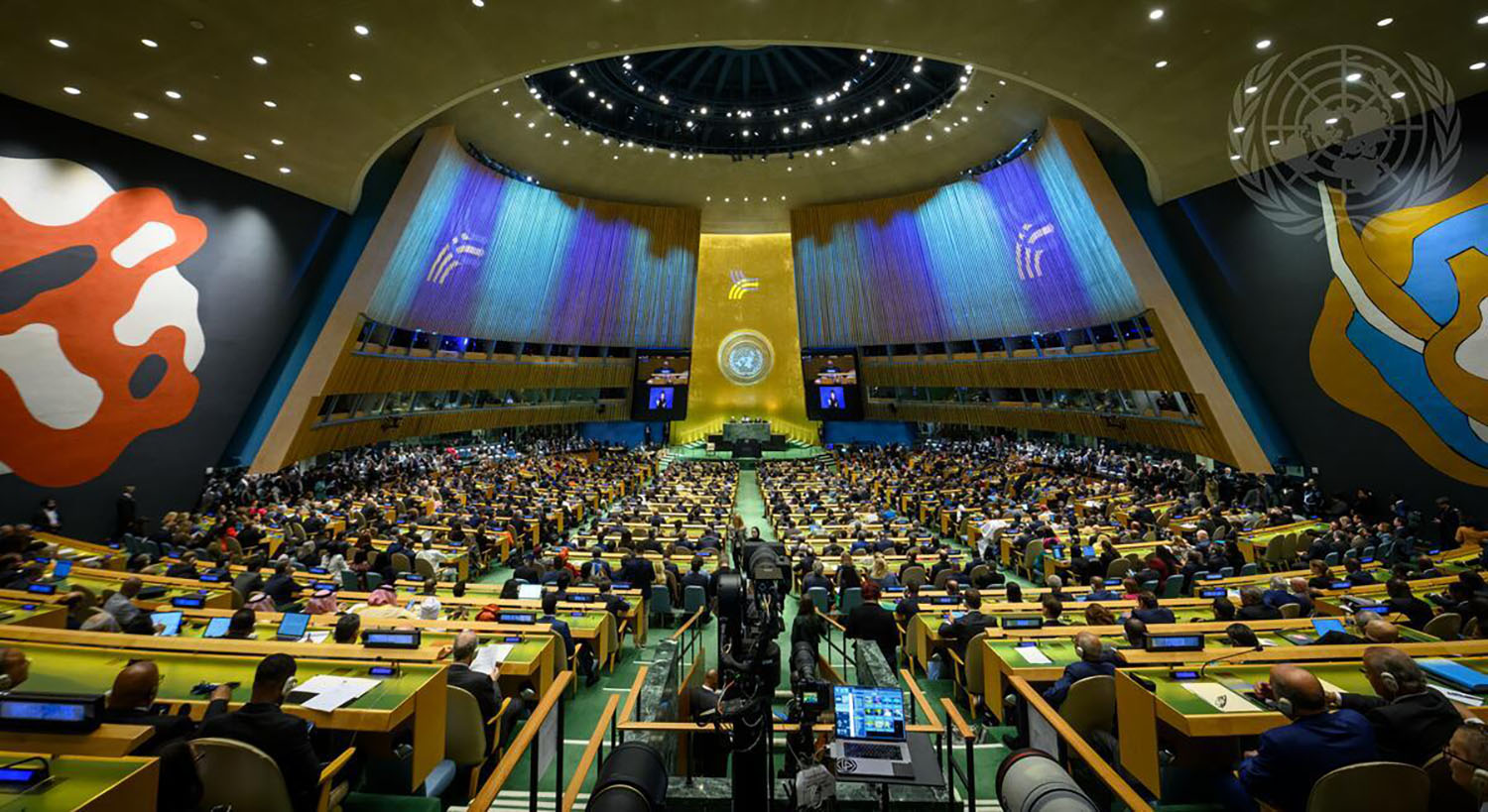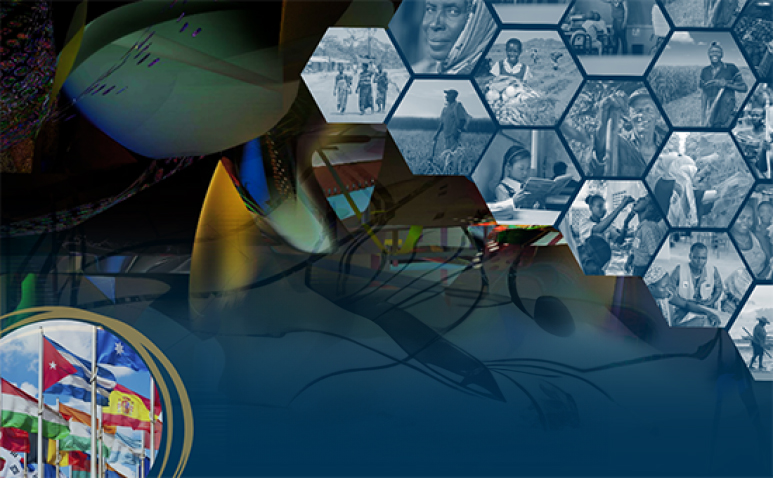On 22 September 2024, world leaders adopted a Pact for the Future that includes a Global Digital Compact and a Declaration on Future Generations. This Pact, shaped in part by the Global Security Institute’s contribution (below) to the zero draft, represents the culmination of a comprehensive, years-long effort to align international cooperation with the realities of today and the challenges of the future.
The most wide-ranging international agreement in many years, covering entirely new areas as well as issues on which agreement has not been possible in decades, the Pact aims above all to ensure that international institutions can deliver in the face of a world that has changed dramatically since they were created. As the Secretary-General has said, “we cannot create a future fit for our grandchildren with a system built by our grandparents.”
Late last year, the co-facilitators, Germany and Namibia, invited written inputs from Major Groups and civil society networks, organizations, non-governmental organizations, the private sector and academia. Stakeholders were encouraged to reflect on the scope of the Pact for the Future outlined in General Assembly Decision 77/568 and to provide concise, concrete and action-oriented recommendations structured around the elements of the Pact for the Future.
Below is the written submission to the zero draft by Jonathan Granoff, President of the Global Security Institute and Representative to the United Nations for the Permanent Secretariat of the World Summit of Nobel Peace Laureates:
Ethical Foundation
There is already a universal ethical norm of equity and justice found in some iteration in every major religion and civilized culture. (1) Whether as a principle to guide our conduct toward the good; “Treat others as you wish to be treated,” (Luke 6:31); or, as an ethical admonition of restraint; “Do not do unto others what you would not have them do unto you.” (Confucius Analects 15:23); this rule, over many different cultures and over long periods of time, has brought both measurable and immeasurable benefits to nations, communities, families and individuals.
Reasonable people of good will everywhere recognize its value. For some it is understood as a majestic gift from God. People of both faith and reason strive to achieve its realization. This ancient insight directs our attention to our conduct toward our contemporaries. When it was expressed in the past, human conduct could not adversely impact the lives and well being of future generations as it can today. There is now an ethical imperative that compels us that did not exist before and that imperative can guide us now:
“Treat the lives and well being of future generations as we wish to be treated.”
This Golden Rule for the 21st Century resonates in these words:
“Intergenerational solidarity is not optional but rather a basic question of justice since the world we have received also belongs to those who will follow us.” (Laudato Si, Section 159, Pope Francis)
Fulfilling this duty of solidarity with future generations is implicit in several SDGs: Goal 13, Addressing climate change and its direct impact on future generations; Goals 14 and 15 Addressing marine and terrestrial ecosystems and ensuring their viability for future generations; Goal 12, Addressing responsible consumption and production which are essential for the well-being of future generations. These are examples of the implicit human security aspects of the SDGs, the need for their fulfillment is emphasized with force and clarity through the profoundly insightful UNDP 2022 document New Threats to Human Security in the Anthropocene Demanding Greater Solidarity.
The duty to achieve the elimination of nuclear weapons is explicit in both the unanimous ruling of the World Court on the subject and Article 6 of the Nuclear Nonproliferation Treaty. By accident, design, or madness nuclear weapons could be used and thus the future remains at an unacceptable risk as long as the disarmament duty remains unfulfilled. Raising the moral concern for the future can help achieve this necessary moral, practical and leally compelling goal.
These documents and many others highlight imperatives for action based on valid utilitarian arguments: The nations and peoples of the world must act differently in order to survive and thrive.
This practical necessity uniquely has a convergence with a moral imperative and that is what is being urged herein. When there is a convergence of the practical and the moral, action can be stimulated effectively.
Meeting the Challenge
Modern science, technology and social organization compel a “new dialogue about how we are shaping the future of the planet.” (Id, Section 14) and the “rights of future generations.” (Id. Section 109). To successfully and wisely guide enough people and institutions this dialogue must include the world’s leaders, scientific, political, technical, cultural, religious and ethical. This dialogue is needed now “so that future generations will not have to suffer the effects of our ill advised delays.” (Id. Section 169)
In the Spring of 2023 the General Assembly requested an Advisory Opinion from the International Court of Justice which includes a request to articulate the law regarding the responsibility of present generations to ensure a sustainable environment for future generations.
A clear articulation of the ethical principle of the Golden Rule for the 21st Century will help the Court and the court of public opinion address the ethical imperative related to protecting the natural world and eliminating weapons of existential mass destruction, practices adverse to a sustainable environment and intergenerational concerns.
Stating the principle and then utilizing it as a means of stimulating moral inquiry and policy analysis could lead to new coalitions of actors who would perceive that people wishing to protect the climate and people working to eliminate nuclear weapons share a common ethical dynamic. Moreover, emphasizing this ethical norm will provide an avenue for many religiously motivated and secular ethically sensitive people to work together. That in itself is a good of enormous value.
But of far greater significance than any utilitarian benefit is the truth that we do have a duty to the well-being and lives of future generations and stating the truth is in itself a necessary good. Fortissima veritas.
We join with a group of distinguished Nobel Peace Laureates, below, who articulated this principle in a letter to Pope Francis with a sense of urgency in advancing the moral and ethical imperative of passing on a beautiful world to our children and their children for generations to come and to respect and honor the Creator of this magnificent planet. We urge the International Court of Justice to include this principle in its deliberations. We urge the U.N. Secretary General Antonio Guterres to include this principle in his articulation of an agenda for the future.
Original Endorsers
- Jimmy Carter
- Leymah Gbowee
- Oscar Arias
- Lech Walesa
- Rigoberta Menchu Tum
- Jose Ramon Horta
- International Peace Bureau
- Albert Schweitzer Institute
(1) Some examples: Buddhism: “Hurt not others in ways that you yourself would find hurtful.” Udanavarga, 5:18; Christianity: “All things whatsoever you would that men should do to you, do you even so to them.” Matthew 7:12; Hinduism: “This is the sum of duty: do not unto others that which would cause you pain if done to you.” Mahabharata 5:1517; Islam: “No one of you is a believer until he desires for his brother that which he desires for himself.” Hadith; Jainism: “In happiness and suffering, in joy and grief, we should regard all creatures as we regard our own self.” Lord Mahavir 24th Tirthankara; Judaism: “What is hateful to you, do not do to your fellow man. That is the law; all the rest is commentary.” Talmud, Shabbat 31a; Zoroastrianism: “That nature only is good when it shall not do unto another whatsoever is not good for its own self.” Dadistan-I-Dinik, 94:5.
The Global Security Institute is dedicated to strengthening international peace and security based on co-operation, diplomacy, shared interests, the rule of law and universal values. Our efforts are guided by the skills and commitment of our team of former heads of state, distinguished diplomats and politicians, celebrities, religious leaders, Nobel Peace Laureates, disarmament and legal experts, and concerned informed citizens. Our focus is on controlling and eliminating humanity’s greatest threat – nuclear weapons.







